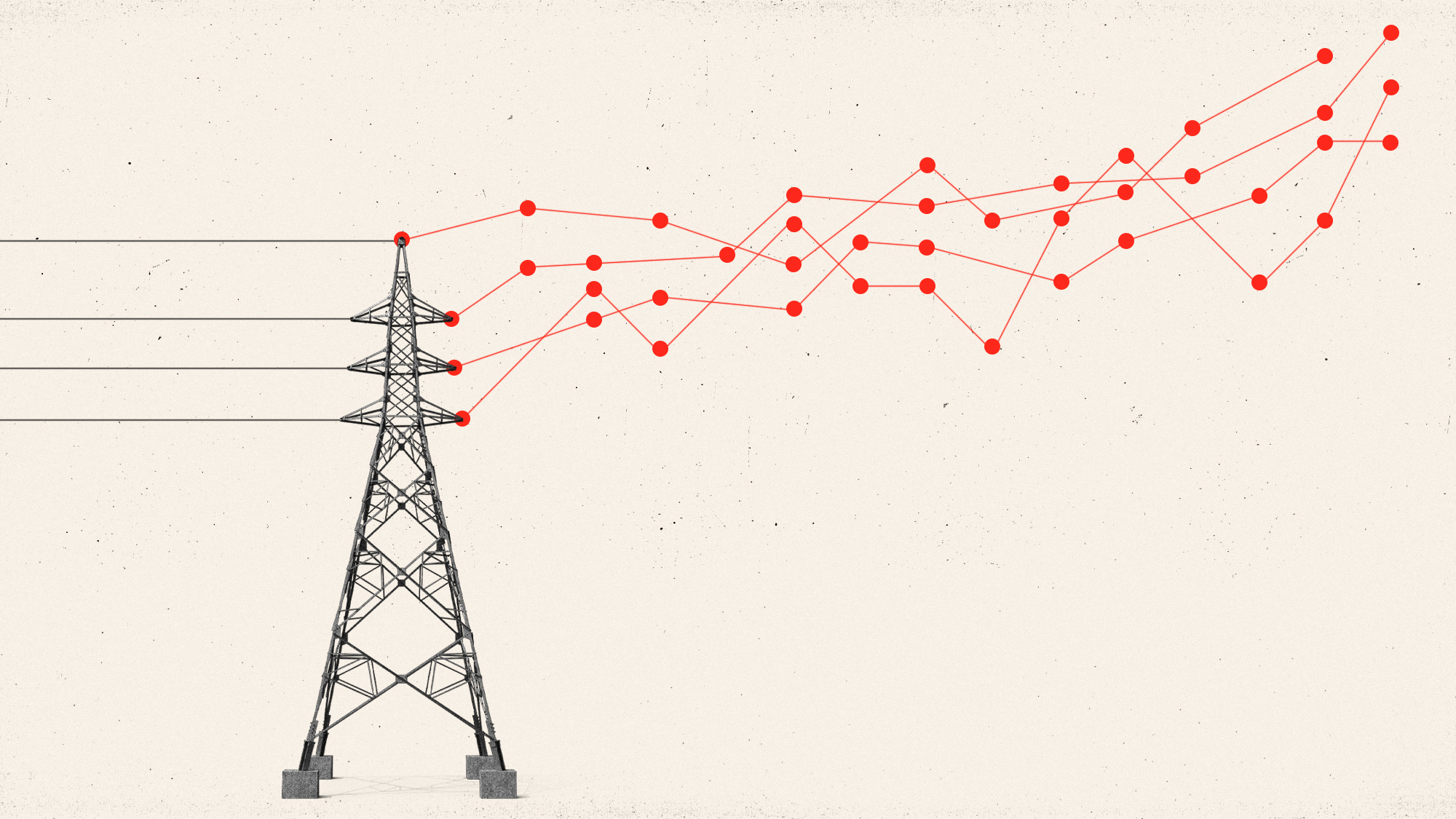Why are electric bills rising so fast?
Data centers for artificial intelligence and the cost of natural gas both contribute


A free daily email with the biggest news stories of the day – and the best features from TheWeek.com
You are now subscribed
Your newsletter sign-up was successful
Electric bills are rising across the U.S., driven by the costs of aging electrical infrastructure and surging demand from data centers that power artificial intelligence. And the bottom line for American households is creeping upward with no end in sight.
Electricity bills are "rising even faster than the cost of groceries," said The Wall Street Journal. While overall consumer prices rose 2.4% year-over-year in May, power costs increased 4.5% during the same period, and federal officials expect this summer's air-conditioning bills to be 4% higher than last year's. That is largely due to a "jump in natural-gas prices," though grid upgrades and data centers also factor into the hike. The rise in power costs began about the same time Russia's invasion of Ukraine started driving up the price of natural gas, which is the "largest source of power generation."
Those growing costs have "Americans worried," said Canary Media. A recent poll showed that nearly three-fourths of respondents report "feeling concerned about rising utility bills." The people who pay those bills are "hurting and they're stressed out," said Charles Hua, the executive director of advocacy group PowerLines.
The Week
Escape your echo chamber. Get the facts behind the news, plus analysis from multiple perspectives.

Sign up for The Week's Free Newsletters
From our morning news briefing to a weekly Good News Newsletter, get the best of The Week delivered directly to your inbox.
From our morning news briefing to a weekly Good News Newsletter, get the best of The Week delivered directly to your inbox.
What did the commentators say?
The country "needs to generate more electricity" to bring down costs, said Matthew Yglesias at Bloomberg. But President Donald Trump's budget bill, currently in the Senate, "would have the opposite effect" by undercutting new solar and wind installations and "undermining the hope" for innovations in geothermal and nuclear power. Getting rid of tax credits for clean energy will make it more difficult to generate more electricity and to bring the price down. "The math does not add up."
AI data centers with the "electricity needs of a small city" are "gobbling up" America's supply of electricity, said Matthew Kandrach at Deseret News. PJM Interconnection, which runs the nation's largest electrical grid, estimates that data center power demands "will equal the electricity needs of 20 million homes" by 2030. That's "putting immense pressure" on the costs paid by American households. Tech companies should do more to "ensure we have the energy affordability" that will be needed to create the future they envision.
What next?
Some solutions are coming at the state level. In Maryland, Gov. Wes Moore (D) announced a $19 million relief fund last week for "limited- and middle-income customers," said CBS News. Marylanders frequently voice their "real and justified concerns over steep bill increases," he said. And they will need the help. It's "going to be another expensive summer for air conditioning," said economist Mark Wolfe to the network.
The average home electricity bill is expected to be $784 this summer. The hotter it gets, the higher the prices will go. It will be an ongoing problem. When power bills go up, said Wolfe, they "tend to stay high."
A free daily email with the biggest news stories of the day – and the best features from TheWeek.com
Joel Mathis is a writer with 30 years of newspaper and online journalism experience. His work also regularly appears in National Geographic and The Kansas City Star. His awards include best online commentary at the Online News Association and (twice) at the City and Regional Magazine Association.
-
 The Olympic timekeepers keeping the Games on track
The Olympic timekeepers keeping the Games on trackUnder the Radar Swiss watchmaking giant Omega has been at the finish line of every Olympic Games for nearly 100 years
-
 Will increasing tensions with Iran boil over into war?
Will increasing tensions with Iran boil over into war?Today’s Big Question President Donald Trump has recently been threatening the country
-
 Corruption: The spy sheikh and the president
Corruption: The spy sheikh and the presidentFeature Trump is at the center of another scandal
-
 Is the US in a hiring recession?
Is the US in a hiring recession?Today's Big Question The economy is growing. Job openings are not.
-
 Trump wants a weaker dollar, but economists aren’t so sure
Trump wants a weaker dollar, but economists aren’t so sureTalking Points A weaker dollar can make imports more expensive but also boost gold
-
 Tariffs have American whiskey distillers on the rocks
Tariffs have American whiskey distillers on the rocksIn the Spotlight Jim Beam is the latest brand to feel the pain
-
 The longevity economy booms as people live longer
The longevity economy booms as people live longerThe Explainer The sector is projected to reach $27 trillion by 2030
-
 How will China’s $1 trillion trade surplus change the world economy?
How will China’s $1 trillion trade surplus change the world economy?Today’s Big Question Europe may impose its own tariffs
-
 Texas is trying to become America’s next financial hub
Texas is trying to become America’s next financial hubIn the Spotlight The Lone Star State could soon have three major stock exchanges
-
 Employees are branching out rather than moving up with career minimalism
Employees are branching out rather than moving up with career minimalismThe explainer From career ladder to lily pad
-
 Who will be the next Fed chair?
Who will be the next Fed chair?Today's Big Question Kevin Hassett appears to be Trump’s pick
